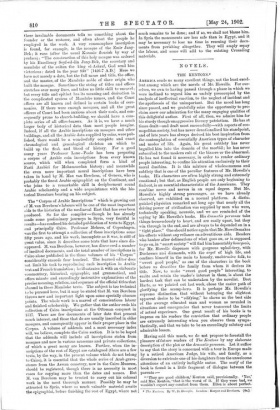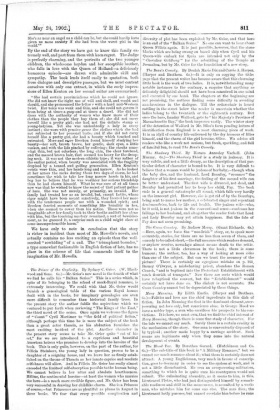NOVELS.
THE KENTONS.*
AMERICA sends us many excellent things, not the least excel- lent among which are the novels of Mr. Howells. For our-
selves, we own to having passed through a phase in which we were inclined to regard him as unduly preoccupied by the analysis of ineffectual emotion, to the neglect of incident and
the apotheosis of the unimportant. But the mood has long since passed, and we gratefully seize the opportunity to pro- claim anew our admiration for the many engaging qualities of this delightful author. First of all, then, we admire him for his sturdy though unaggressive literary patriotism. He has at times dealt—and dealt most successfully—with aspects of cos- mopolitan society, but has never denationalised his standpoint, and of late years has always derived his best inspiration from the contemplation of essentially American types of character and modes of life. Again, his great subtlety has never beguiled him into the domain of the morbid ; he has never subscribed to the modern cult of the bizarre or the abnormal, He has not found it necessary, in order to render ordinary people interesting, to confine his attention exclusively to their moral dustbins. It is this mixture of wholesomeness and subtlety that is one of the peculiar features of Mr. Howells's books. His characters are often highly strung and extremely emotional ; but that, as English people are only beginning to find out, is an essential characteristic of the Americans. They combine nerve and nerves in an equal degree. But Mr. Howells's highly strung personages, as we have already observed, are exhibited on a normal platform. A distin- guished physician remarked not long ago that nearly all the driving power of civilisation was supplied by men who were, technically speaking, neurotic, and we are reminded of the saying by Mr. Howells's books. His dramatis personae take things tremendously to heart, and are easily upset, but they win through in the end, and are always to be depended on in a "tight place." One should notice again that Mr. Howells makes his effects without any reliance on adventitious aids. Readers who hanker after delineations of what goes on, or is supposed to go on, in "smart society" will find him lamentably bourgeois, for Mr. Howells dispenses with gorgeous upholstery, with Duchesses and diamonds, with the argot of high life, and confines himself in the main to homely, unobtrusive folk, to "sweet good people," as one of the characters in the book before us describes the family from whom it derives its title. Now, to make "sweet good people" interesting, to excite and retain the reader's interest in them, is about the hardest task that can be undertaken by the novelist. Bret Harte, as we pointed out last week, chose the easier path of glorifying the scamp-hero. It is perhaps Mr. Howells's supreme distinction that without betraying the slightest apparent desire to be "edifying," he shows us the best side of the average educated man and woman as revealed in situations and emergencies that never transcend the limits of actual experience. One great result of his books is to impress on his readers the conviction that ordinary people are extremely interesting when you observe them sympa- thetically, and that we take to be an exceedingly salutary and admirable lesson.
Having said this much, we do not propose to forestall the pleasure of future readers of The Kentons by any elaborate description of the plot or the dramatis personae. Let it suffice to say that the story is concerned with a tour in Europe made by a retired American Judge, his wife, and family, as a diversion to extricate one of his daughters from the unwelcome attentions of an entirely ineligible suitor. The motif of the book is found in a little fragment of dialogue between the parents :— "' They are good children,' Kenton said, provisionally. Yes,' said Mrs. Kenton, that is the worst of it. If they were bad, we wouldn't expect any comfort from them. Ellen is about perfect.
* The Kenton', By W. Howells. London.: Harper and Brothers. -[6e.].
She's as near an angel as a child can be, but she could hardly have given us more anxiety if she had been the worst girl in the world:" By the end of the story we have got to know this family ex- tremely well, and part from them with keen regret. The Judge is perfectly charming, and the portraits of the two younger children, the wholesome hoyden and her suceptible brother, who falls in love with the Queen of Holland—a deliciously humorous episode—are drawn with admirable skill and sympathy. The book lends itself easily to quotation, both from dialogue and descriptive passages, but we must content ourselves with only one extract, in which the early impres- sions of Ellen Kenton on her second suitor are summarised;
"She had certain provincialisms which he could not ignore. She did not know the right use of will and shall, and would and should, and she pronounced the letter r with a hard mid-Western twist. Her voice was weak and thin, and she could not govern it from being at times a gasp and at times a drawl. She did not dress with the authority of women who know more of their clothes than the people they buy them of; she did not carry herself like a pretty girl ; she had not the definite stamp of young-ladyism. Yet she was undoubtedly a lady in every instinct; she wore with pensive grace the clothes which she had not subjected to her personal taste; and if she did not carry herself like a pretty girl, she had a beauty which touched and entreated. More and mere Breckon found himself studying her beauty—her soft, brown brows, her gentle, dark eyes, a little sunken, and with the lids pinched by suffering; the cheeks some- what thin, but not colorless ; the long chin, the clear forehead, and the massed brown hair, that seemed too heavy for the droop- ing neck. It was not the modern athletic typo; it was rather of the earlier period, when beauty was associated with the fragility despised by a tanned and golfing generation. Ellen Kenton's wrists were thin, and her hands long and narrow. As he looked at her across the racks during those two days of storm, he had sometimes the wish to take her long narrow hands in his, and beg her to believe that he was worthier her serious friendship than he had shown himself. What he was sure of at all times now was that he wished to know the secret of that patient pathos of hers. She was not merely, or primarily, an invalid. Her family had treated her as an invalid, but, except Lottie, whose rigor might have been meant sanatively, they treated her more with the tenderness people use with a wounded spirit; and Breckon fancied moments of something like humility in her, when she seemed to cower from his notice. These were not so imaginable after her family took to their berths and left her alone with him, but the touching mystery remained, a. sort of bewilder- ment, as he guessed it, a surprise such as a child might show at some incomprehensible harm."
We have only to note in conclusion that the story is richer in incident than most of Mr. Howells's novels, and actually contains no less exciting an episode than the well- merited " cowhiding " of a cad. The "triumphant bounder," a type somewhat fashionable in English fiction of late, has no place in the scheme of life that commends itself to the
imagination of Mr. Howells.







































 Previous page
Previous page